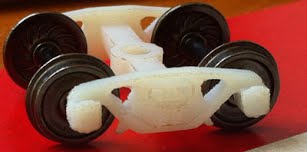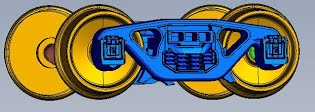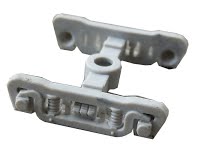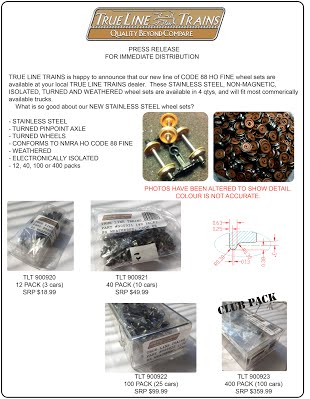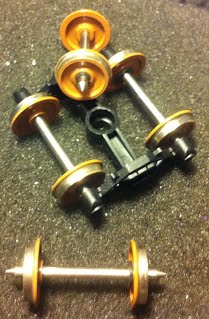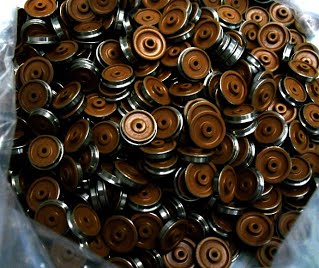Freight Car Trucks and Wheelsets
HO Scale Trucks $7.99/pair Wheelsets 33" Smooth Back Cast Wheels 33" Ribbed Back Cast Wheels $11.95/pack of 12 33" Fine:HO Weathered Wheels $18.49 / pack of 12 $49.99 / pack of 40 $99.99 / pack of 100 $359.99 / pack of 400 Complete List of Models Check dealers for availability 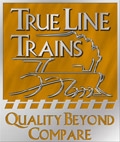 | Freight Car Trucks We have a variety of freight car trucks available for separate purchase. They come pre-installed with our cast wheelsets with with either flat or ribbed back wheels. 50-ton ARA / AAR Cast Sideframe with Spring Plank Frequently erroneously called 'Bettendorf' truck, we offer these trucks with coiled or leaf springs. We also offer a version with Simplex bolsters. They come pre-installed with our standard cast wheelsets (see below for more information). 50-ton Dalman Two-Level Trucks - Coming soon! A 1920's prototype, it's design provided a higher capacity at a reduced weight compared to the then standard design. What became known as the Dalman design was patented by George C. Chiles in 1923, assigned to John W. Dalman, and licensed to other companies. The design incorporated additional springs. The outside set of springs were mounted higher than the inner package of springs, creating the recognizable 'Two-Level' design. 70-ton Barber Roller Bearing Pretty much the standard 'modern' era freight car truck. Roller bearing trucks were required by AAR rules on 100 ton cars built or rebuilt after 1966. In 1968 they were required on all new cars, regardless of weight, and this was expanded to include rebuilt cars in 1970. The earlier solid (aka friction) bearing trucks were not allowed in interchange after 1980. BX Express Trucks - New! Freight cars (typically box cars or reefers) assigned to passenger service were frequently outfitted with special high speed trucks. This truck is one of those designs. Wheelsets We offer two types of wheelsets. First is a cast wheelset. Cast in a die (like our injection molded plastic models), which allows us to include details such as the raised lettering on the face of the wheel, and ribbed backs. Second is new turned wheelsets. Turning the wheels creates a better wheel in terms of it's 'roundness' and smoothness that can't be duplicated in casting. On the other hand, it also lacks the prototypical details available on the cast wheels. Cast Wheels Our original wheelsets. Available with a smooth back as used on rolled steel wheels and still used on cars today. We also offer a ribbed-back 'chilled cast-iron' wheel. Cast iron wheels were banned on new or rebuilt cars starting in 1958, banned as replacement wheels on existing cars in 1964, and from interchange service in 1970. Both feature prototypical raised lettering on the face of the wheels. All our wheels are CODE 88, including our new Turned Wheel sets with Steel axles*! Turned, Weathered True Fine Scale Code 88 Wheelsets All stainless steel turned wheels with stainless steel axles. Not brass plated with nickel silver that will wear over time. Pre-weathered front and back. We chose NOT to weather the axles becasue that is where electrical pick up can occur for powered cars. These pre-weathered wheels are REAL Fine Scale Code 88. Most Code 88 wheelsets simply use a narrower tread, but still use a very oversized RP25 flange. This is only typically noticeable from the end of the car. Our wheelsets use the NMRA Fine:HO RP instead, giving a better appearance but without requiring the modifications to turnouts and crossings as switching to Proto:87 standards. The flange is closer to a true scale representation of the prototype, but will operate on most layouts. Will they work on your layout? We've been testing them extensively on various commercial turnouts and haven't had any issues. Newer style turnouts (like Micro Engineering) are actually set up with shallower frogs and work better with true Code 88 wheelsets. RP25 flanges ride higher on these types of turnouts. In most cases, the only noticeable difference is that a wheel might drop slightly when going through a long turnout frog (#8 and higher). On poorly tuned trackwork, this could cause a derailment. This is most noticeable on equalized trucks (typically sprung, but can also be of a type using a separate bolster). Most model truck sideframes are rigid, and the drop is lessened as a result. As long as your trackwork and wheel spacing is in gauge, you should be OK. Contact Randy to get the low-down! Here they are being manufactured! 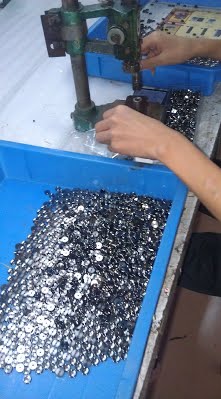 Pre-production samples. Final product may vary. |

